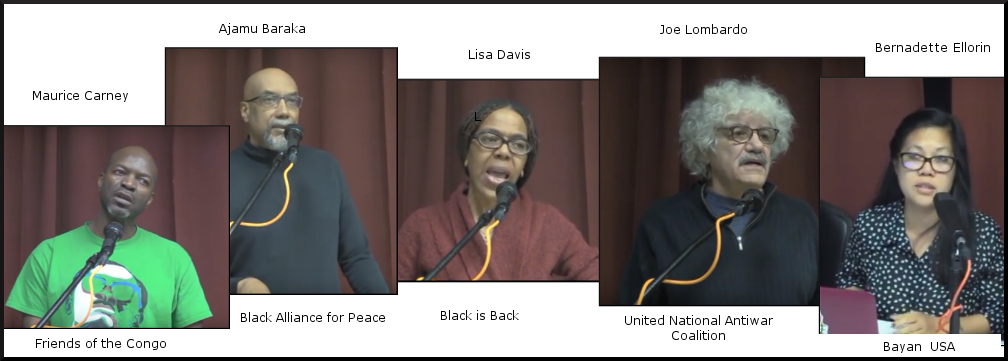The continuous and never-ending wars abroad have contributed to the militarization of the U.S. borders, communities and the entire country. Important reforms that have been fought for by generations of activists are under attack by both major political parties. It is by understanding we have a common enemy that we can build a mass movement to fight back.
Editor: This is a truly interesting and illuminating Panel discussion with uniquely informed speakers. Really worth a viewing. Bernadette Ellorin and Maurice Carney provide an intimate look at the social and political issues in the Philippines and Africa. The other speakers provide varying perspectives on the relationship between the wars at home and the wars abroad.
Lisa Davis looks at the practical reflection of the wars abroad in the wars at home.
Joe Lombardo of UNAC exposes the perfidy of the news we hear regarding the war in Yemen:
“Saudi Arabia thought they could defeat Yemen immediately, but they couldn’t do it. They couldn’t do it because … we’ve all heard those lies about the Houthis and all … It’s the people of Yemen. It’s not a civil war that’s going on there. It’s the United States and Saudi Arabia and the United Arab Emirates are fighting a war against Yemen and … those people are not going to give up their country.”
Ajamu Baraka makes the broad connection between the war ‘at home’ and the wars’ abroad’. He says:
We are part of this process of trying to revive a powerful antiwar movement in this country. We see the black community and the Black Alliance for Peace as a fundamental part of that process. We see that people who are traditionally part of the left in this country have to be part of that process. We say that this issue of peace and anti-imperialism has to be the central issue at this moment.
We have to connect our understanding …. with a material understanding of the basis of this war agenda, that is imperialism. So we have to connect up the moral opposition crystallized in a pro-peace position with a material analysis reflected in an anti-imperialist position. […] Then we have to connect that up with domestic repression. The imperial aggression we have to struggle with globally is only the flip side of the domestic repression that we know that the US state is unleashing … So those connections have to be made.”
October 31, 2018 @ 7 p.m.: Solidarity Center, 147 W 24 Street 2nd Floor New York, NY
View this important discussion sponsored by:
1. Black Alliance for Peace (BAP)
2. Black Is Back Coalition
3. United National Antiwar Coalition (UNAC)
4. People’s Power Assembly
Hear: – Ajamu Baraka, Black Alliance for Peace (BAP) – Joe Lombardo, United National Antiwar Coalition (UNAC) – Lisa Davis, Black is Back Coalition and People’s Organization for Progress (POP) – Bernadette Ellorin, BAYAN USA – Maurice Carney, Friends of the Congo Wednesday
For more information:
518.281.1968,
UNACpeace(at)gmail.com,
info(at)blackallianceforpeace.com
License: Creative Commons Attribution license (reuse allowed)
